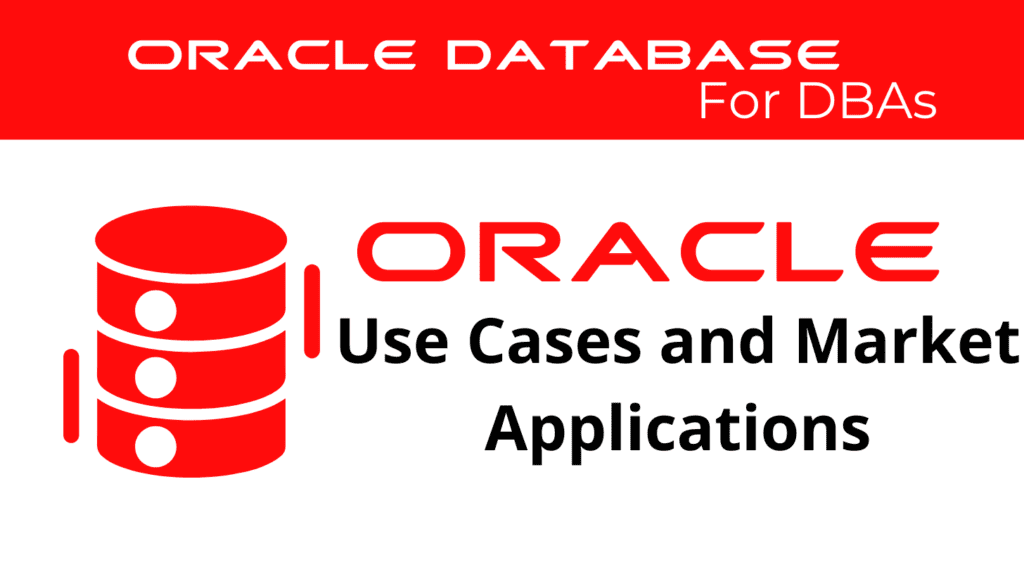
The Oracle Database stands out in the realm of database management systems due to its robust and comprehensive features. In this blog, we will explore the use cases and market applications of Oracle Database, providing examples of how it is utilized in different industries and sectors. Oracle db Market Applications is huge!
Use Cases and Oracle DB Market Applications
Oracle Database is used across a variety of industries, showcasing its versatility and robustness. These use cases highlight the key functionalities that make Oracle Database a preferred choice for businesses.
1. Financial Services
Other use oracle database use cases: In the financial sector, Oracle Database is essential for managing large volumes of transactions securely and efficiently. Banks and financial institutions rely on Oracle’s high availability and advanced security features to protect sensitive data and ensure uninterrupted service. For instance, real-time transaction processing and fraud detection systems are powered by Oracle’s robust database infrastructure.
📢 You might also like: Definition and Responsibilities of an Oracle DBA (Category: Oracle Database Admin)
2. Healthcare
Other use oracle database use cases: Healthcare organizations use Oracle Database to manage patient records, streamline operations, and ensure regulatory compliance. The ability to handle large datasets with high reliability is crucial in this industry. For example, hospital management systems and electronic health records (EHR) platforms leverage Oracle Database to provide secure, scalable solutions that improve patient care and operational efficiency.
3. Retail
Other use oracle database use cases: In the retail industry, Oracle Database supports various functions, from inventory management to customer relationship management (CRM). Retailers use Oracle to analyze customer data, optimize supply chains, and manage point-of-sale systems. A prominent example is the use of Oracle Database in e-commerce platforms, where it handles massive amounts of transactional data and customer interactions seamlessly.
4. Telecommunications
Other use oracle database use cases: Telecommunication companies depend on Oracle Database for managing network operations, billing systems, and customer data. The database’s ability to scale and handle high volumes of data traffic is critical in this sector. Oracle’s advanced analytics also help telecom providers to monitor network performance and enhance service delivery.
5. Manufacturing
Other use oracle database use cases: Manufacturing firms use Oracle Database to streamline production processes, manage supply chains, and track inventory. The integration of Internet of Things (IoT) devices with Oracle Database allows manufacturers to collect and analyze data from production lines in real-time, improving efficiency and reducing downtime. For example, predictive maintenance systems rely on Oracle’s data capabilities to forecast equipment failures and schedule timely repairs.
Highlight of the Key Functionalities that Differentiate Oracle Database
The key functionalities that differentiate Oracle Database from other DBMSs are its robust scalability, high availability, advanced security, comprehensive management tools, cloud integration, and advanced analytics. These features collectively contribute to making Oracle Database a powerful and versatile platform for managing data.
Scalability and Performance
The ability to scale seamlessly is a hallmark of Oracle Database. Real Application Clusters (RAC), as previously mentioned, are instrumental in providing this scalability. This functionality ensures that as business data grows, the database can handle increased load without performance degradation.
High Availability and Disaster Recovery
Oracle’s commitment to high availability is evident in its suite of disaster recovery tools. Data Guard and Flashback Technology are prime examples of how Oracle Database can quickly recover from failures, ensuring business continuity. These tools are crucial for industries where data availability is paramount.
Advanced Security Measures
Security in Oracle Database is multi-faceted, encompassing encryption, access controls, and auditing. Transparent Data Encryption (TDE) ensures that data is secure at rest, while fine-grained access control allows for detailed permissions management. These features are essential for compliance with regulations and protecting sensitive information.
Comprehensive Management Suite
The Oracle Enterprise Manager (OEM) provides a centralized platform for managing databases. Its capabilities for monitoring, diagnostics, and tuning are unmatched, making it easier for administrators to maintain optimal performance and security in their database environments.
Integration with Modern Technologies
Oracle Database’s support for cloud integration and advanced analytics positions it well for modern business needs. The Oracle Cloud Infrastructure (OCI) and Oracle Autonomous Database offer scalable and automated solutions, reducing the administrative burden and allowing businesses to leverage cloud benefits. Advanced analytics capabilities enable the extraction of actionable insights, supporting data-driven decision-making.
See more info on Oracle’s website!
Conclusion
In conclusion, the use cases and market applications of Oracle Database demonstrate its versatility and robustness. From financial services to manufacturing, Oracle Database provides reliable, secure, and scalable solutions that meet the needs of various industries. Its advanced features and integration capabilities make it a leading choice for businesses seeking a comprehensive database management system.
Be Oracle certified, this world is full of opportunities for qualified DBAs!





